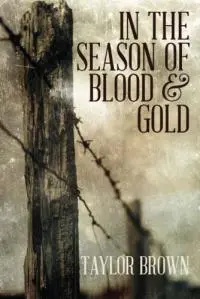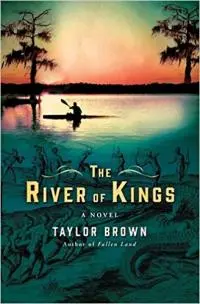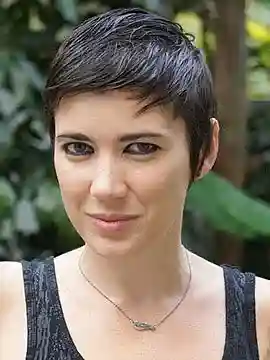Gods of Howl Mountain, the third novel by acclaimed and all-around-awesome author Taylor Brown, hits shelves today. And what better way to celebrate than to take a moment to read up on whiskey, snake handlers, and writing-gritty-from-the-gut with the man himself? I was lucky enough to get a sneak peek at Gods of Howl Mountain— a dark, lyrical story of deep love and deeper secrets in 1950s North Carolina— and even luckier to have a chance to sit down with Taylor Brown and pick the mind of a master.
I’m just going to come right out and say it—Gods of Howl Mountain is my favorite work of yours to date. You know I’ve been a fan since day one, since your short story collection In the Season of Blood and Gold first came out in 2014. This was followed up by your Civil War epic Fallen Land, and last year’s sweeping, century-bridging novel The River of Kings. And now we come to Gods of Howl Mountain, a gritty, raw-boned tale of 1950s Carolina bootleggers. As with all of your previous work, Gods of Howl Mountain is lyrical and lavish, but there’s an edge to the story of Rory Docherty and Granny May that clearly sets this novel apart. Maybe it’s that very rawness I’m picking up on, the sense that a layer of narration was peeled back to give the reader a closer look. Did you have any notion of this when you were writing Gods of Howl Mountain? That you were working on a story that was taking you, and your readers, in a different direction?
Aw, shucks—thank you so much for the kind words, Steph. To be honest, I think I did have some notion of that rawness when I was writing the book—particularly the early drafts. I’d been reading a lot of classic noir like Raymond Chandler, and I wanted to write with a slightly harder, sharper style that recalled my short fiction more than my other novels. I think, partly, this was related to the characters themselves. Granny May does not mince words, and I didn’t think her book should either.
From the very first page of Gods of Howl Mountain I knew I would find a kinship in this book. One of your epigraphs is the ‘signs following’ passage from the Book of Mark, and that alone told me I was entering into a story I would find darkly comforting and familiar. As you know, I’ve written quite a bit about charismatic religion in my own books, as have other Southern writers, including Wiley Cash, of whom we both are fans. What do you think is this fascination writers have for religions on the fringe? And why was this an element you chose to explore in your novel?
 Well, honestly, I first started on this book back in 2012, when I hadn’t read any novels that brought snake-handling to the fore. To be honest, I remember being a little crestfallen when I realized that Wiley Cash—who is now a great friend of mine—had written about serpent-handling and glossolalia in his incredible novel A Land More Kind than Home, which I waited for years to read, until I’d finished a couple drafts of Gods of Howl Mountain.
Well, honestly, I first started on this book back in 2012, when I hadn’t read any novels that brought snake-handling to the fore. To be honest, I remember being a little crestfallen when I realized that Wiley Cash—who is now a great friend of mine—had written about serpent-handling and glossolalia in his incredible novel A Land More Kind than Home, which I waited for years to read, until I’d finished a couple drafts of Gods of Howl Mountain.
I grew up as a Catholic minority in South Georgia, where charismatic religion was quite prevalent. I knew of people holding multi-day prayer vigils over dead relatives, hoping to revive them before calling the authorities or coroner, and I had coworkers who spoke quite casually about their visions and visitations from Christ. Growing up Catholic, I was just enough of an outsider to find these stories fascinating.
But for me, the true fascination began with my great friend and editor Jason Frye, who grew up in Logan, West Virginia. His own grandfather had made a profit from capturing rattlesnakes to sell to local churches. Jason has a photograph of this one-armed snake-handling preacher on his office wall, and he directed me to Dennis Covington's incredible book Salvation on Sand Mountain: Snake Handling and Redemption in Southern Appalachia.
I think we find such religious practices so fascinating because of the mystic element—the images of worshipers spinning like dervishes with live rattlesnakes hanging around their necks or speaking in tongues—to me, these recall a shamanic mysticism that’s been with us long before our present religious traditions, spanning cultures and centuries and geographies. Something that’s been with us since prehistoric times. Glossolalia itself is like some wild, hysteric poetry, you know? There is something so deep and pagan and primitive in these moments, which seems almost antithetical to the stiff-spined Puritanism of American lore—or the somber tones of Catholicism, for that matter. Here are people willing to put their very lives in jeopardy as a testament to their faith. My guess is that the saints of history were possessed of such crazed conviction, and how could that not be fascinating in the modern age?
All three of your novels involve war, or some elements of war or the military: Fallen Land is built around the Civil War and Sherman’s March, The River of Kings involves a character who is a Navy Seal and also flashes back to French and Spanish conflicts with Native American tribes, and now Gods of Howl Mountain features a main character who is a young Korean War veteran, bearing both physical and mental scars. Do you consider any of your books to be ‘war novels’? And what do you think has influenced you to write about war, life during wartime, and the effects of war on a character’s psyche?
I would not call any of these books war novels. Rather, I think they are books that deal deeply with emotional and psychic trauma. I was interviewed recently by The Wrath-Bearing Tree—a journal founded and run by combat veterans—and they asked about my interest and attentiveness to veterans.
It’s only been since I’ve started writing a little about my father, who was killed in a motorcycle accident last fall, that I’ve realized where this interest might have started for me. My father was twenty years old in 1967—right smack in the crosshairs of Vietnam—and I grew up hearing stories of his time in the Army. He spent his 21st birthday on guard duty at Fort Sill, Oklahoma, marching through a hailstorm, and graduated from law school and Army OCS in the same year. He was never sent to Vietnam, thank God, but the threat of that war hovered over him for years, as it did over his entire generation. He had so many friends who were impacted, and I saw from an early age how very moved he was by that war—the emotional and psychic trauma on his friends. Hell, his whole generation. I think, as a burgeoning writer, you're maybe especially attuned to such stories or emotions.
Moreover, 9/11 took place during a very formative time for me: when the towers fell, I was a freshman in college, and I knew that my generation would be going to war. The military was never an option for me, as I was born with bilateral club feet, which have necessitated a multitude of reconstructive surgeries, but so many of my friends had to consider their involvement or lack thereof. I remember feeling guilty that I wasn’t over there—it didn’t matter whether I agreed with the politics of the war or not (I didn’t). Very simply, men and women my age were going through hell and I was not—or at least my own hells seemed pale in comparison.
Of course, 9/11 kicked off the Global War on Terrorism, so our nation has been at war for most of my adult life. I think it’s far too easy for the average citizen to forget that—after all, so little of the general population has “skin in the game.”
But, as a writer, I think our job is not to be incognizant or unaware of such things, you now? I think our job, in some part, is to try and empathize with the experiences and traumas of others, to put ourselves in their shoes (or boots).
 Okay, let’s take a moment to talk about Granny May, who I’m sure will instantly become a fan favorite. She’s a tough, independent mountain woman with a devilish attitude and more than a few secrets. I especially love her because she’s unapologetically complicated and defies being put into any type of character box. How did you go about building the character of Granny May? Was she always someone in the back of your mind who you wanted to create or did she slowly develop throughout the novel writing process?
Okay, let’s take a moment to talk about Granny May, who I’m sure will instantly become a fan favorite. She’s a tough, independent mountain woman with a devilish attitude and more than a few secrets. I especially love her because she’s unapologetically complicated and defies being put into any type of character box. How did you go about building the character of Granny May? Was she always someone in the back of your mind who you wanted to create or did she slowly develop throughout the novel writing process?
I would say that Granny May jumped fairly full-born onto the page. Again, it’s only been very recently that I’ve recognized where she might have been conceived. My mother’s side of the family is Lebanese. My great-grandfather, whose birthday I share, was sent to the United States from Mount Lebanon in 1889, at fourteen years old, with only a priest and one cousin, and went to medical school at the University of Kentucky—later becoming a country doctor and medical examiner in Breckinridge County, Kentucky. He had five daughters and one son. In my experience, the women on that side of the family are just tough as nails.
Now, I don’t want to get in trouble for saying this! They certainly did not share any of Granny’s professions or her penchant for uncouth language or behavior. But those steely nerves of hers—I think those were inspired by the women on that side of the family.
Recently, I’ve had cause to be reminded of that strength, and I’ve realized how much that toughness—and my personal awe of it—resides in Granny’s character.
In addition to being one tough cookie, Granny May is a folk healer. You include a lot of details in the novel about the herbs Granny May collects and the remedies she concocts. I think I actually wrote in the margins next to one passage- “Foxfire Books?” in regard to your research methods. How did you go about researching all of the herb lore and healing knowledge that Granny May has acquired? Was it from consulting books such as The Foxfire Book collection, or did you have a more immersive research experience?
Well, it started with the Foxfire books for sure, as well as some other specialty books on the subject. But, like a lot of things, you can only learn so much from books. Later, by complete chance, I ended up seeing someone who was in herb school in Asheville, and she was an incredible help for the specifics of Granny May's folk medicine. She took me root-digging and herb-hunting in the mountains and even made some of the tinctures and potions included in the novel. I’m incredibly grateful for her help and thanked her in the acknowledgments—even if she broke my heart a little in the end, haha.
Gods of Howl Mountain is the story of Granny May and her grandson Rory Docherty, but at the center of the novel is a shadow character, Rory’s mute mother Bonni, and the mystery of what happened to her on a fateful night when she was only a teenager. We get glimpses of Bonni through Rory and Granny May, but her story is also told in broken pieces scattered throughout the novel in sections and indicated by headers referencing phases of the moon. Why did you choose to structure Bonni’s narrative this way and in this format? And did you write Bonni’s story separately and then divide it throughout the novel or did it come to you in pieces as you were writing, the way the reader receives it?
Bonni came to me in largely the same way the reader receives her—in short, bright fragments scattered throughout the novel. I wanted her to be somewhat of a mystery to me, as she is to Rory and even Granny May. Her sections were not in the first few drafts, but I felt that she deserved more. I wanted her to be the beautiful spirit that she is. Not weak, in my opinion—but rather, a creature almost too good for the world. I think she is as powerful as Granny in her own way. Whereas Granny is slightly devilish, Bonni is angelic. Whereas Granny says things few women would, Bonni never speaks. Whereas Granny would kill the panther on her roof, Bonni would pray for the life of a dying grasshopper. And yet, in the end, they would both go to extremes to protect—or avenge—those they loved.
Your novels are always rich and multi-layered, but I particularly enjoyed the inclusion in Gods of Howl Mountain of birds and bird symbology, both in the narrative and in important elements of the plot. You’ve mentioned before that birds have a significant meaning for you in your own life—does this translate to your writing as well?
I think it’s certainly beginning to. In fact, that layer of the story only came in later drafts—probably as my own relationship with certain birds grew stronger. Animals always seem to be a theme in my work, and in recent years I have (as you know) grown especially fond of one particular bird of prey: the swallow-tailed kite. Without getting too deep into the particulars, I have a tattoo of Audubon’s “swallow-tailed hawk” and I wear a swallow-tailed kite back patch on my denim vest, largely in remembrance of my dad.
I think, somewhat gradually, Bonni’s illustrations of the birds became more and more prominent, as did the role of the Carolina parakeet in the story. There is something to me that’s at once so powerful and so fragile about certain birds.
I was particularly moved by the extinction of the Carolina parakeet, which was one of only two parrots native to the United States and once ranged from the eastern states to the Midwest and Great Plains. The last Carolina parakeet died in captivity at the Cincinnati Zoo in 1918. Reports of wild specimens were made throughout the 1920s and 1930s—none substantiated—and the bird was finally declared extinct in 1937. Sadly, this felt especially relevant given the state of so many iconic species in today’s world.
And finally, Gods of Howl Mountain is your third book released over the past three years. You’ve been writing and publishing at a breakneck pace it seems. What’s next for you? Do you have a work currently in progress?
I tend to play my cards pretty close to my chest when it comes to my current projects, but suffice to say I have not been sitting on my laurels. Fingers crossed it won’t be too long before another one!

About the author
Steph Post is the author of six novels, including Lightwood, Miraculum and Terra Incognita. She graduated from Davidson College as a recipient of the Patricia Cornwell Scholarship and holds a Master’s degree in Graduate Liberal Studies from UNCW. Her work has most recently appeared in Garden & Gun, Saw Palm, and Stephen King’s Contemporary Classics. She has been nominated for a Pushcart Prize, a Rhysling Award and was a semi-finalist for The Big Moose Prize. She lives in Florida.








